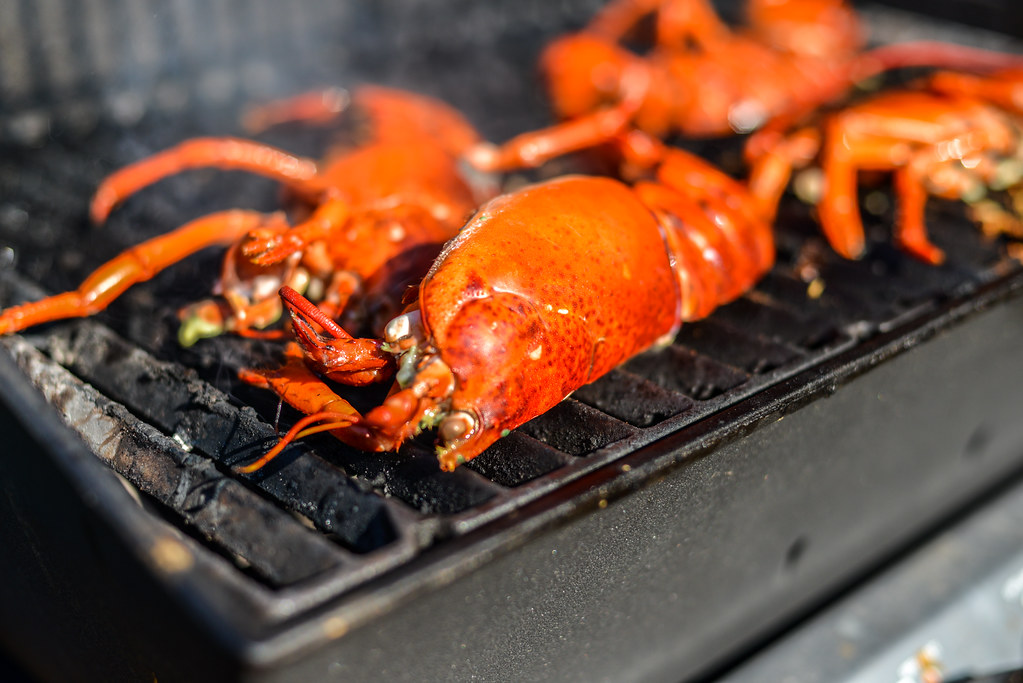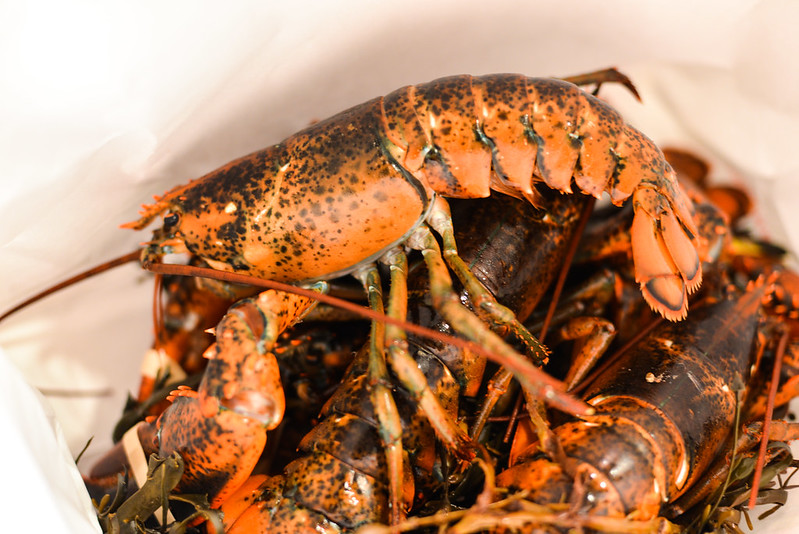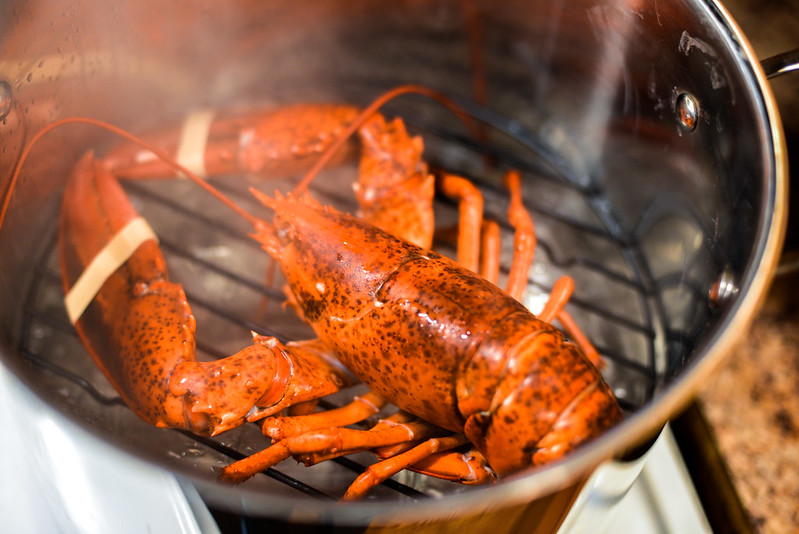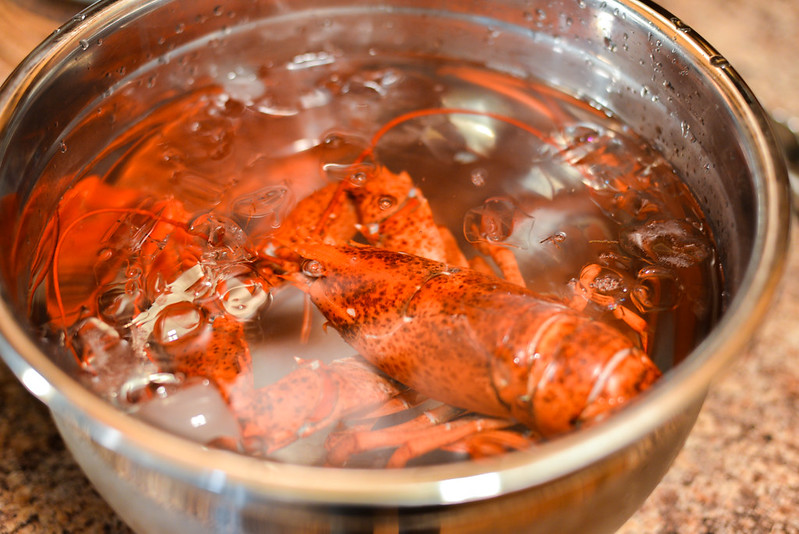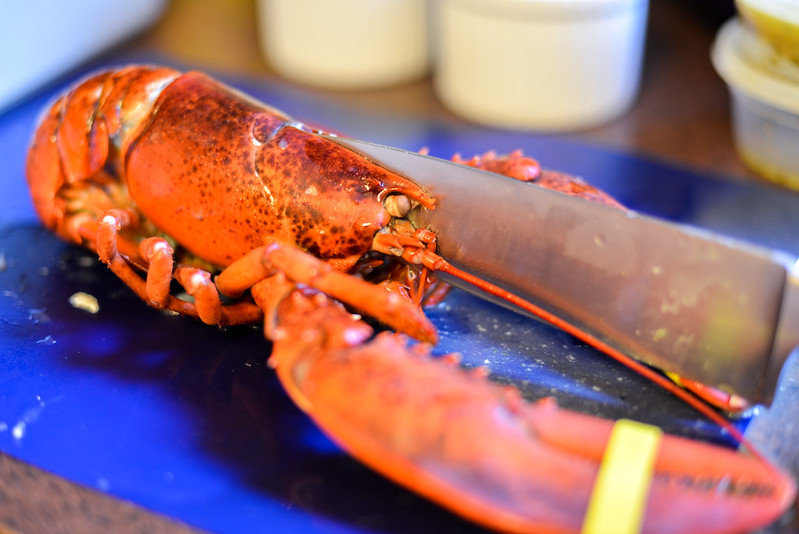Grilled Lobster with Lemon-Shallot Butter
For all the meat I've gone through over the years, I've yet to ever kill what I eat. The idea doesn't bother me, but I'm a city boy and hunting isn't some dream I feel like I need to fulfill. Not being much of seafood guy either, I've never even experienced probably the easiest of kills to deal with—lobster. That was until last summer when Serious Eats was in the midst of some intense lobster coverage and I decided I wanted in on the action to try my hand at grilling these tasty crustaceans. So I dropped a line to my editor, and before I knew it, a package of lobsters shipped direct from Maine the day before was waiting at my doorstep.
If you've never had a live animal delivered by FedEx, I highly recommend it. I was a giddy to find that package waiting for me when I returned from work, and promptly brought upstairs and unpacked it to find four two-pound Maine lobsters crawling around in a paper bag on a bed of seaweed. Ideally I would have gone to my fishmonger and gotten the lobsters the day I was going to eat them, but since they were provided to me and I had a day or two until I was able to grill them, I moved that entire bag into my refrigerator to keep the lobsters alive for the freshest meat.
When the day came to cook my new friends that had taken up residence in the crisper drawers, I opted to steam them first. It's perfectly fine to split a lobster and throw it on the grill—a quick cut through the head is actually the fastest, and arguably, most humane way to kill a lobster. Since I was bringing these to someone else's house to grill though, I thought it would be a little nicer to have them dead on arrival.
Steaming or boiling isn't really much crueler to the creature than splitting it—the lobster's brain stops functioning pretty quickly when steamed or boiled. So to me, steaming seemed like the best solution since it would both kill the lobster quickly and also set the meat without cooking it through. This last point was important since I wanted most of the cooking to be done on the grill.
One by one, I steamed off each lobster for two minutes only. Then, as each was finished, I immediately moved them to an ice bath to stop the cooking and ensure the meat was only set, but not yet really cooked.
The lobsters were then thrown in a cooler and these four fine fellows made their last journey of a well-traveled life riding the rails from Astoria, Queens to Jersey City, New Jersey. Once at their final destination, and with the grill preheated, it was time to split them open.
Being a first-time lobster cook, I removed the green tomalley that just looked unsavory to me. As I scooped out that unsightly mess, the host of the party looked on in dismay as I was apparently trashing his prized piece—to each his own, I guess.
I then removed the claws—I wanted to grill them separately since they wouldn't cook at exactly the same rate as the rest of the meat—and the split lobsters were brushed with a lemon-shallot butter and placed over direct heat, cut side down. When the meat started to turn opaque, the lobsters were flipped and kept cooking until they registered 135°F on an instant read thermometer. Once done, the lobsters were transferred to a serving tray and I placed their claws on the fire and let them roast until finished. Four two pound lobsters took just over ten minutes from beginning to end on the grill.
The lobsters were then set out for the guest and served with the remaining lemon-shallot butter. I thought these tasted fantastic—the meat was tender and sweet, and with an extra brushing of lemon-shallot butter, they had a nice brightness and richness that accentuated the natural flavor of the lobster. Keeping in mind that I'm not much of a seafood eater, I was looking for validation from those more experienced in the art of knowing a fine lobster from a bad one. I found it in one compliment after another that confirmed that these tasted as fresh as can be. So even through mail from Maine, to a day in the fridge, and a trip to Jersey, these lobsters delivered, and I learned one more food that the grill seemed to only make better.
You Might Also Like
Comments
-
David Somerville Josh,
Awesome looking lobsters! I would have pitched the green stuff as well!! -
Fritz What is the purpose of salting the water for steaming ? Salt stays in the water doesn't it? Isn't that's how it's harvested? Let the water evaporate and what's left is salt.
-
Josh @Fritz I haven't done side-by-side comparisons of salted vs. unsalted water, but the idea is salted water will result in a more briny/sea water flavor.
-
Chris " Since I was bringing these to someone else's house to grill though, I thought it would be a little nicer to have them dead on arrival."
Best line ever for a food blog!
